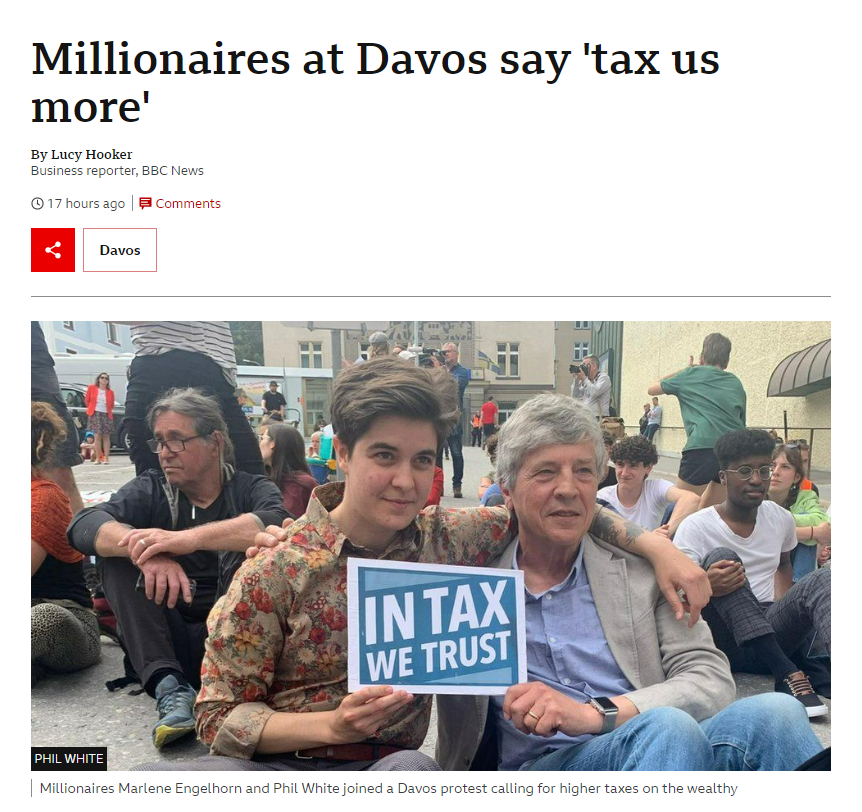Max Lawson on Oxfam’s latest Davos broadside and his worries that his salary is about to get cut

We are living through extraordinary times. Extraordinarily bad for the vast majority of humanity. Extraordinarily good if you are one of the richest people in the world.
Normally they meet in January at Davos, but that face-to-face meeting was postponed, due to fears around COVID-19. So we also have an extraordinary Davos in May. Instead of ski boots, the global elite will be picking edelweiss and humming tunes from the Sound of Music.
Billionaires have had dramatic periods of growth in their fortunes before, but nothing like during the pandemic, which was truly off the charts, as our report, Profiting from Pain (out this week) shows. A new billionaire was minted every 30 hours, and billionaires made more in the 24 months of the pandemic than they did in the first 23 years (1987-2010) since Forbes started publishing records of billionaire wealth [apologies for earlier mistake in the title, saying the ‘previous 23 years’ – my bad. Duncan.]
I was trying to imagine a sketch, like the famous Monty Python one, where the billionaires sit around and compete:
Jeff: ‘I had an amazing pandemic. My fortune increased $100 billion, I own the Washington Post and I flew to space in a cowboy hat.’
Elon: ‘Hah! That’s nothing. You think you had an amazing pandemic? I am now the world’s richest man, not you any more, and more importantly, my spaceship is substantially bigger than yours. Oh, and I might be buying Twitter.’
In previous years at least the world could point to a reduction in extreme poverty. The numbers of people living on less than $1.90 a day declined steadily for two decades. At the same time the gap between the rich world and the developing world was steadily shrinking.
This indeed was one of the main rebuttals to the Oxfam’s focus on inequality and billionaire wealth. We should be concerning ourselves instead with extreme poverty, and that was falling. What did it matter if a few people got a lot richer, if those at the bottom were seeing an improvement in their lot?
Regardless of the responses to that argument, of which there are many, sadly the reduction in extreme poverty has now been thrown into reverse. The pandemic, and now the food and energy crisis, have led to increases in extreme poverty for the first time in decades. The gap between rich nations and developing nations is growing for the first time in over thirty years.
So for the first time in a very long time we are seeing both things happen at once: a sharp, significant and simultaneous spike in both extreme wealth and extreme poverty.

I sometimes joke that I am glad that as the person in charge of inequality policy at Oxfam, my pay is not performance-related. I would have been fired long ago. We are living through an historic jump in inequality, which was already too high before the pandemic. This in turn has huge and negative knock-on effects: on our politics, our happiness, our safety, our health, our ability to end poverty, and to come together to stop runaway climate breakdown. It has multiple negative impacts on the other inequalities that divide us, such as gender and race.
In our new report, written by the brilliant Alex Maitland, we also look at specific groups of billionaires who are doing particularly well – most notably the food billionaires and energy billionaires, who have been pocketing an extra $1 billion dollars every two days.
Global food prices have spiraled by over 30 per cent in the past year (and are set to rise still higher) and 62 new food billionaires have been created over the last two years. The super secretive Cargill, one of the world’s largest food traders, now counts 12 family members as billionaires, up from eight before the pandemic. Together with just three other companies, the Cargill family controls 70 per cent of the global agricultural market.

The solutions discussed in our report major on tax: windfall taxes on corporates, emergency solidarity taxes on billionaire fortunes, and permanent wealth taxes.
The debate about windfall taxes is a live one in the UK and Europe, and President Biden has revived his plans for a billionaire tax, much to the chagrin of Jeff and Elon. He is talking powerfully in favour of unions and against monopolies too.
Our close allies the Patriotic Millionaires and the Fight Inequality Alliance have been leading the calls to tax the rich, and in the ultimate man-bites-dog story, we saw millionaires protesting outside Davos calling for higher taxation of rich people.
As always, we will keep fighting.
